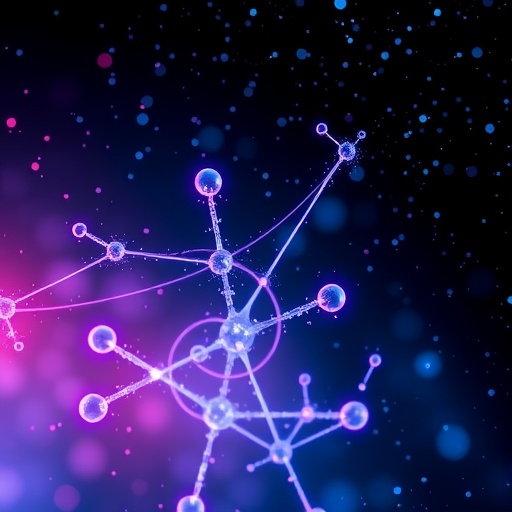In a groundbreaking advancement in astrochemistry, a research team has introduced a novel artificial intelligence framework named GraSSCoL, designed to predict astrochemical reactions with remarkable precision. This innovative tool addresses long-standing challenges in the field by reducing dependency on traditional and often expensive experimental approaches. Traditional methods typically rely on intricate laboratory setups and expert analysis, which can be both time-consuming and limited by available resources. The GraSSCoL framework, however, leverages deep learning techniques to overcome these limitations, demonstrating the potential of AI to revolutionize the way we understand chemical processes in space.
Published in the reputable journal Intelligent Computing on May 15, this research underscores the importance of accurately predicting complex chemical reactions, which are pivotal for decoding the cosmic evolution story. The team rigorously evaluated their model against the ChemiVerse dataset, a comprehensive collection that includes 10,624 expert-validated astrochemical reactions. By focusing specifically on predicting reaction products from known reactants, the researchers achieved impressive Top-k accuracy scores that significantly outperformed previous state-of-the-art models. The results indicate that GraSSCoL achieves a remarkable 82.4% accuracy for Top-1 predictions, 91.4% for Top-3, and reaches as high as 93.7% for Top-10 predictions.
GraSSCoL, which stands for graph to SMILES and supervised contrastive learning, utilizes a unique deep learning architecture that allows it to learn directly from graph-structured data. This capability is essential for effectively generating potential astrochemical reaction products, which are represented using SMILES strings. SMILES, or Simplified Molecular Input Line Entry System, is widely recognized for its ability to encode complex molecular structures as linear strings, facilitating computational analysis in chemical research.
The framework operates in three distinct stages: pre-processing, generation, and re-ranking. During the generative stage, the model employs a specialized graph encoder, working in conjunction with a transformer-based sequence decoder. This innovative combination effectively generates candidate reaction products from the provided reactants. Notably, the graph encoder has been adapted to account for the unique characteristics of astrochemistry, such as the prevalence of single-atom ions in space chemistry. Through the introduction of a virtual edge mechanism, the model captures a rich array of structural and chemical information, going far beyond traditional one-dimensional molecular fingerprints.
Following the generation of candidate products, the re-ranking phase of GraSSCoL addresses a notorious challenge known as the hallucination problem, prevalent in many generative models. This issue arises when invalid or chemically implausible products are predicted. To mitigate this risk, the framework employs supervised contrastive learning techniques. This approach groups together representations of similar samples—namely, reactants and their corresponding products—while simultaneously distancing dissimilar samples, thereby ensuring greater accuracy in predictions.
To optimize prediction accuracy further, the research team fine-tuned chemical sequence representations using transfer learning on ChemBERTa, a pre-trained language model that taps into a wealth of chemistry databases relevant to astrochemistry. By marrying advanced deep learning techniques with established chemical data, the team significantly enhanced the robustness and reliability of their model’s predictions.
Throughout the research process, the team maintained a rigorous five-fold cross-validation training regimen combined with Adam optimization and beam search decoding strategies. The careful tuning of hyperparameters was crucial in maximizing predictive performance, ensuring that GraSSCoL stands as a robust framework in the field of astrochemistry.
Despite these advancements, the research acknowledges certain limitations inherent in current methodologies. Particularly, GraSSCoL does not yet handle reactions involving complex mechanisms such as photo-dissociation or ion-neutral charge exchange processes, largely due to the absence of sufficient data in these areas. Recognizing these gaps, the research team emphasizes the importance of future work aimed at integrating large language models and expanding the dataset. Such efforts are expected to include condition-specific predictions that account for varying variables like temperature and hydrogen density, ultimately paving the way for a more comprehensive understanding of astrochemical reaction networks.
In conclusion, the introduction of GraSSCoL represents a significant milestone in the intersection of artificial intelligence and astrochemistry. With its innovative approach to predicting chemical reactions and its rigorous validation against an established dataset, this framework not only opens doors for further research but also lays the groundwork for future advancements in the field. As scientists explore deeper into the cosmos, tools like GraSSCoL will be indispensable in deciphering the intricate web of chemical interactions that shape the universe.
Subject of Research: Astrochemical reactions prediction using AI
Article Title: A Two-Stage End-to-End Deep Learning Approach for Predicting Astrochemical Reactions
News Publication Date: 15-May-2025
Web References: Intelligent Computing
References: 10.34133/icomputing.0118
Image Credits: Credit: Jiawei Wang et al.
Keywords
AI, astrochemistry, deep learning, GraSSCoL, chemical reactions, SMILES, ChemiVerse, predictive modeling, contrastive learning, data-driven science.




